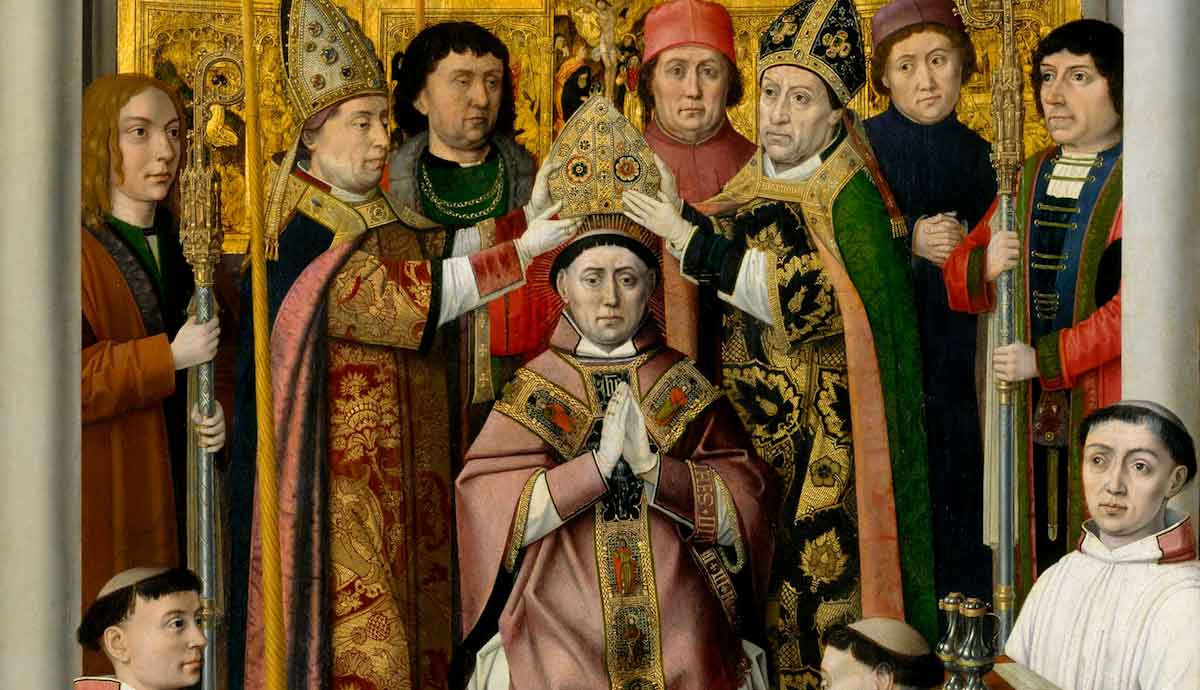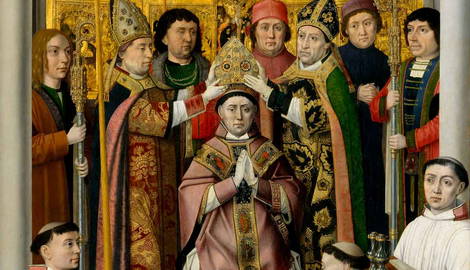
Does history have a meaning, and can it be discerned? Can we have a philosophy of history? This article will examine whether Saint Augustine could be the first person to formally philosophize about history. After attempting to define “philosophy of history” and “philosopher of history,” we will cover a biography of Saint Augustine, focusing on a few key details that influenced his inquiries into historical, philosophical, and theological studies. Lastly, we will focus on whether his monumental City of God can be considered the first text on the philosophy of history.
What Does It Mean for Someone to Be a Philosopher of History?

Before we can address whether Saint Augustine’s City of God was the first philosophy of history, we must clearly define what a philosophy of history is; can there even be such a thing? Some argue that we all naturally have a philosophy of history, while others claim that such a category is a misnomer. Maybe those in the latter group debate this because we cannot ever record all of history. The passage of time never stops, so new “history” keeps collecting. History, therefore, cannot be closed; it is not like a novel with a start and a finish. However, it is like a novel in that we must read it in order, to better understand it.
There may be shared concerns, questions, and inquiries when we philosophize about history, but this raises the next question: when can we know there is enough shared to group these questions into a philosophy of history? Even more broadly, defining philosophy itself is debated—probably the most out of any academic discipline. While we may disagree on categories, what does seem to be certain, nevertheless, is that they are inevitably created and used.

The philosophy of history, as an assumed category, is generally divided into two main types: speculative and analytic. The speculative tradition looks at past events and circumstances, and its goal is to essentially try to make sense of history. The analytic tradition critically analyses the thinking of the historian and how the historian works in his or her discipline, so from this perspective, the goal is not to obtain meaning but rather empirical investigation and logical analysis.
With these definitions in mind, it is generally argued that we can most concretely date speculative philosophy of history to Voltaire, given that he is credited with coining the term “philosophy of history” in his work that encouraged the reader to think more critically about the meaning of history. The origins of any realm of analytic philosophy date to the twentieth century. Saint Augustine, who lived from 354 until 430 C.E., came well before any of this, so for this reason, along with several others, we may question his role as a “philosopher of history.”
The Life of Saint Augustine: The Path to Conversion

Saint Augustine was born in 354 in present-day Algeria. He was not raised in a particularly religious household; his mother was Christian, but his father was a pagan. In fact, he was not baptized until he was thirty-three years old, though his mother certainly would have wanted that to have happened much earlier. The path to eventually becoming a Bishop was a long and difficult one, but it helps us understand how he got there, and how he became the father of Christian-infused philosophy in the West.
Much of this is documented in Saint Augustine’s Confessions (probably the most popular of all his writings and considered by many to be the greatest spiritual autobiography), which represented another designated “first” of its genre. Augustine, in fact, presumably produced many “firsts.” He also created his own art form that he titled “Soliloquies,” which took the shape of inner dialogues, as well as several philosophical ideas that can be traced back to him. For example, he has some very existentialist ideas (though this nineteenth and twentieth-century movement can also be traced even further back to some Stoic ideas), and he declared something similar to what we call Descartes’s seventeenth-century revolutionary Cogito argument (the notion of “I think, therefore I am”). Undeniably, he was a major influence on Western thought for a millennium.

At the age of sixteen, Augustine left for Carthage, which was a bustling city that provided many temptations for such a young man. During this time, he fell prey to sinful behavior of all sorts, an experience that left a permanent mark on him in the form of a constant tension between the striving for other-worldly spiritual goodness in the face of worldly corporeal badness. It was also during this time that he had a mistress, with whom he fathered a son named Adeodatus.
Augustine became especially religious when he moved to Milan in 384. He was inspired by Bishop Ambrose, who baptized Augustine in 387. In 391, Augustine, accompanied by his mother, returned to Algeria, where he became a priest. Not long after, he became the Bishop of Hippo, which was located in present-day Tunisia. He would stay there until his death in 430. By this time, he had already written quite a lot—but it was during these later years that he composed his masterpiece, City of God.
Saint Augustine’s City of God

City of God is arguably the first speculative philosophy of history. It was the longest and most arduously researched of Augustine’s writings, as it took him thirteen years to compose the twenty books the work is composed of, which totaled over one-thousand pages. It is contended that this is the first formal philosophy of history because, for the first time, history is taken as something that provides meaning, rather than being a subject comprised of just a catalog of sorts. In other words, for the first time on record, history would tell us a meaningful story rather than just describe geography, events, and people.
Before Augustine, history was often seen as something cyclical and repetitive, without any kind of explicit purpose (though it may supply us with patterns). But with the birth of Christianity came a clear purpose for humanity; thus, history would have a purpose as well—and that comes from God. With Augustine, history would be seen as something linear.
A main source of Augustine’s inspiration for this work was to reconcile the fall of the Roman Empire with the growth of Christianity. The topic of the philosophy of history would not be of much interest again until the eighteenth century, when it would be revived by French Enlightenment thinkers who would, conversely, use historical narratives to support their efforts toward increased secularization. When Rome fell in 410, the Romans blamed Christianity, saying that too many had turned away from the Roman Gods who had supported the city to become so glorious. Augustine, on the other hand, argued that Rome fell because more did not convert sooner.

History, for Saint Augustine, like every other part of his philosophy, is connected to God. No longer was history analyzed as a series of relatively unmeaningful, fleeting events, as now it was seen as a kind of drama unfolding, all according to God’s divine plan. This, he argued, plays out in a conflict between two cities: the City of God and the City of the World. Essentially, the former is the site of that meaning, that purpose we are striving for, and the latter is the one humanity has found itself struggling with ever since the original fall from grace. The one truly peaceful city is that of God, and the City of the World is where humans struggle against corruption.
Rome, for example, was way too desiring of glory and fell to this sinful greedy human nature. In the City of the World, one strives for glory, driven by self-love, and in the City of God, one is given glory by being driven by a love for God. Augustine’s bleak view of humanity in the City of the World was influenced by his biography, being a man who confessed how he constantly fought against acting sinfully. Thus, again, we must strive to get as close as possible to the City of God. The state is just a necessary evil—the Church is superior to the State, and this would remain a dominant view in the West for the next thousand years. Only God has complete providential control, so while there is a plan to history, we cannot see nor comprehend it; we can only have faith that it is proceeding as it should.
Saint Augustine: Philosopher, Rhetorician, and/or Theologian?

To designate a start date for an official, formal text on the philosophy of history, we need to have that category clearly defined. Saint Augustine’s view is a teleological one because it proposes an end purpose to history. The problem is that this purpose is hidden from us, so does that make looking for it a useless endeavor?
Augustine’s view is so thoroughly imbued with Christian notions that some argue his views are more theological rather than philosophical, and thus maybe he is more of a theologian rather than a philosopher. His skill with writing leads some to categorize him as a rhetorician. Can he hold all of these titles? This is a tough quandary to address because most of the philosophy of the Medieval period in the West, in which Saint Augustine is right at the starting point, is permeated with the Judeo-Christian view. But Augustine probably would not have cared much about this charge, as he was strictly focused on his faith.
A teleological position poses another important problem: if everything has already been planned out, and there is no way for us to know all the details of that plan, do we have any agency? In other words, are we just blindly playing God-given roles? Is it useless to try to bring about change, even if we think that may bring peace and justice?
Either way, perhaps our final judgment here can be that Saint Augustine is a philosopher who philosophized on history because of the way he forced his successors to raise inquiries into the study and meaning of history. In much of the history of philosophy, as in the history of the philosophy of history, what is most important and impactful are the questions raised, rather than the answers proposed.










